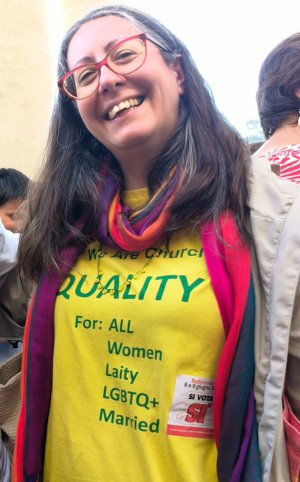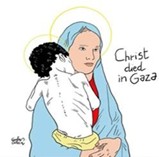Interview with Elza Ferrario, Coordinator of Noi Siamo Chiesa
29 August 2025
We Are Church, an international network for ecclesial renovation, recently received confirmation that they will participate in the Jubilee of Synodal Teams and Participatory Bodies, which will take place on October 24–26, 2025. Because this is the first time that a Catholic Church reform group that supports LGBTQ+ equality as one of its issues has been invited to participate in a Vatican-sponsored meeting, Bondings 2.0’s Elisa Belotti spoke with Elza Ferrario, co-coordinator of We Are Church Italy, about the group’s hopes for the Jubilee and their vision for a renewed Catholic Church.
What brought We Are Church to apply for the Jubilee of Synodal Teams? And what do you expect from this event?
 At the end of May 2025, applications opened for the Jubilee of Synodal Teams, but at that point only members of the official synodal teams and diocesan participatory bodies were invited to apply Then, on July 23rd, the Synod Office website published an update: “Given the growing interest also of individual faithful who are not members of synodal teams/participatory bodies, the General Secretariat of the Synod has decided to open up applications for the work on the r afternoon of October 24th, subject to availability, which will conclude with a meeting with Pope Leo XIV”.
At the end of May 2025, applications opened for the Jubilee of Synodal Teams, but at that point only members of the official synodal teams and diocesan participatory bodies were invited to apply Then, on July 23rd, the Synod Office website published an update: “Given the growing interest also of individual faithful who are not members of synodal teams/participatory bodies, the General Secretariat of the Synod has decided to open up applications for the work on the r afternoon of October 24th, subject to availability, which will conclude with a meeting with Pope Leo XIV”.
Participation was limited to that single afternoon. There is no access to the workshops and language groups planned for October 25, which appear to be the most interesting part of the program.
Even so, I decided to apply as an “individual believer” along with seven other members of We Are Church (our chair Colm Holmes, three people from Austria and three from Germany). Days went by without any confirmation from the Synod Secretariat. Eventually, Holmes wrote to the Secretariat, to inquire about our applications and soon the office answered back. Not only were our applications accepted, but they also wrote:
“On behalf of His Eminence Cardinal Grech, we desire to inform you that, as a sign of appreciation towards you, you are invited to take part in the whole Jubilee of Synodal Teams program, if you desire, specifying that you are part of ‘another participant organization’.”
A very welcome surprise: the opportunity for We Are Church to participate fully in the Jubilee of Synodal Teams!
Over the years, we have followed the synodal process with great interest, seeing it as a chance for change in the Catholic Church. The October 25th program, with its workshops and language groups, is especially interesting. It will be an opportunity to engage with Catholics from all over the world and to witness, through our presence, that the Catholic Church is not a monolith. Within it there are legitimately progressive voices calling for urgent change.
We Are Church has long worked together with LGBTQ+ Catholic groups. How has this experience enriched you? In what way do you think the Church could grow through queer Catholic voices?
In 2021, when the Global Synod and the Italian Synod were announced, We Are Church Italy helped to launch a grassroots synodal network. Today, that network brings together about thirty groups from across Italian civil society: feminist, LGBTQ+, pacifist and others. Some are large, national organizations, others are small and local. For four years, we have been walking together, producing about fifteen joint documents submitted to both the Global and Italian Synod Secretariat offices.
I find this journey extraordinary! The first documents we produced were thematic: one from LGBTQ+ groups, another from feminist associations, another on ecumenism, and so on. But then, in April 2024, came a breakthrough: Come ad esempio. La realtà è superiore all’idea (Such as. Reality is superior to the idea), written collectively by all the organizations. It was truly a choral document, where everyone began from their own experience to say together:
“On our journey, we experienced the beauty of an inextricable network of women, men and non-binary people, and we became convinced that everyone’s contribution is an essential treasure for the journey of the Church. Knowing that our life experience itself is the Word of God, we want to continue listening to it, understanding it and offering it to the whole Church, especially on the more controversial issues. Together we renew the call of earlier steps in the synodal journey and we ask the Church to deepen its commitment to research and value everyone’s contribution, which can be vital pastorally and sacramentally as the Church responds to the signs of the times.”
Along with the late Bishop Pedro Casaldáliga [a Portuguese bishop who as a strong advocate of liberation theology], we proclaim:
It is late but it is time for us.
It is late but it’s all the time we have at hand to make the future.
It is late but it’s early morning if we insist a little”.
Queer people remind us that no one is ordinary. Each person is unique, created and loved by God just as they are. The Christian God is a queer God, beyond norms and measure, excessive, immeasurable. The Catholic Church should remember this and shape itself in God’s image to become the Church of the ever-widening tent, not one hemmed in by stakes. For if too many stakes are planted, the risk is that God will be left outside.
We’re now well into 2025 and the Jubilee year. What are your thoughts on the Jubilee we are living?
My hope is that this Jubilee will not become a missed opportunity, reduced simply to crossing the Holy Door to profit from an indulgence, as if we were still living a medieval Jubilee, as if the Joint Declaration on the Doctrine of Justification of 1999 [a document of reconciliation between the Lutheran World Federation and the Catholic Church] had never happened.
“For it is a jubilee. It shall be holy to you”, we read in Leviticus 25:12. To be “pilgrims of hope,” which isthe theme of this Jubilee, should mean recognizing God’s Lordship, which flows from the truth that the land can never be truly owned, the call to gratuitousness, the practice of justice, the end of inequality and unfairness, the idea of a society of sisters and brothers and the protection of creation.
In the Judeo-Christian tradition, a Jubilee is a time to start again, a time to pause and then move forward into the future with hope, to do teshuvah, to convert and to go back to the source of the Scripture.
I am not sure whether the Catholic Church’s leadership is really moving in this direction. We have a new pope, Leo XIV, who in his very first public appearance, introducing himself to the world, emphasized the need to continue the synodal process. That is very positive. But we still do not know what he thinks about the more controversial issues, or how willing he will be to embrace a vision of a Catholic Church united not in uniformity, but in diversity.
We Are Church works for a deep reform of the Catholic Church, on a personal and community level. From your perspective, what are the most urgent issues today?
On August 4, we sent a letter about the synodal process to all the bishops in the world. Since the Final Document of the Synod on Synodality allows different decisions to be reached in different places, under the principle of unity in diversity, we believe it is time for concrete initiatives to be taken. Without any changes in the short-term, the vision of a synodal Church will no longer be credible. So we call on bishops to support appropriate and concrete initiatives in our dioceses, including:
- Competent women and men preaching and leading parishes;
- Lay led liturgies with communion;
- Co-operation, mutual attendance and Eucharistic hospitality at services in other Christian churches;
- Majority voting on parish & diocesan pastoral councils and minutes published online;
- Annual publication of financial reports;
- Ordination of women deacons;
- Ad limina reports published online;
- Diocesan pastoral councils recommending nominations as bishops;
- Fair financial support and professional guidance for those affected by sexualised abuse in the church;
- Pastoral care for LGBTQ+ people in every parish.
Our yellow T-shirt with green lettering summarizes these commitments with the theme: “EQUALITY for: ALL – Women, Laity, LGBTQ+, Married.”
On May 30, We Are Church Italy participated in a private audience with the pope, alongside the other movements that promoted the Arena di Pace (Arena of Peace) gathering in Verona, Italy, in 2024 [an ecumenical and international justice and peace gathering]. Nearly 300 people were present, most wearing their organization’s T-shirt. We too wore ours, but security stopped us. We were told to cover the slogan with jackets. It seems clear that the word “equality” is considered threatening in the clerical world.
Finally, what do you expect from the Jubilee of Synodal Teams?
Pope Francis reminded us that “reality is superior to the idea” and we want to start again from the reality of a Church that is a communion of women and men who share the same faith and the same baptismal dignity. For us, this feels like a kairos, a fitting time to demand justice, not benevolence or pity, but a justice rooted in truth and hope. A Church that simply welcomes “todos, todos, todos” is not enough. We don’t want to be merely welcomed. We want to berecognized because we are already Church, exactly as we are!
–Elisa Belotti, New Ways Ministry, August 29, 2025
 Italian priests and bishops unite to demand justice, peace, and truth regarding the tragic situation affecting the Occupied Territories of Palestine.
Italian priests and bishops unite to demand justice, peace, and truth regarding the tragic situation affecting the Occupied Territories of Palestine.


 At the end of May 2025, applications opened for the Jubilee of Synodal Teams, but at that point only members of the official synodal teams and diocesan participatory bodies were invited to apply Then, on July 23rd, the
At the end of May 2025, applications opened for the Jubilee of Synodal Teams, but at that point only members of the official synodal teams and diocesan participatory bodies were invited to apply Then, on July 23rd, the